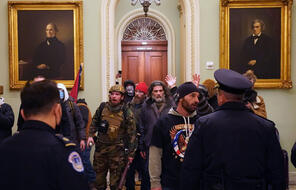Breadcrumb
Goin' to Chicago
At a Glance
Language
English — USSubject
- Civics & Citizenship
- History
- Social Studies
- Racism
Goin' to Chicago
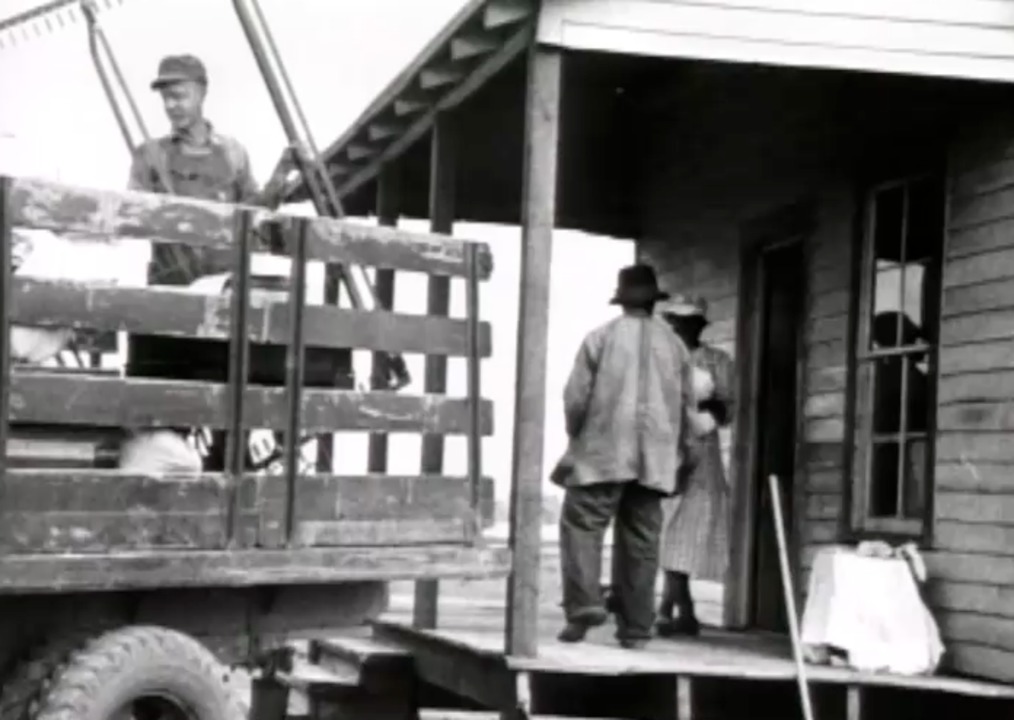
Other than him, your first-- your first five rows that way is people from Greenville, Mississippi.
[LAUGHING]
Hi, guys. I'm Viethel Wills from Greenville, Mississippi. We're on our way down the highway, headed for Greensboro.
Oh, I enjoy coming back.
Guys, whoever would've thought the road from Mississippi and back and homecoming and all of this would've lead to sitting on the bus, being interviewed, looking out the windows, seeing how wonderful and great everything is, how great God is. Here we have an opportunity that perhaps a lot of the people would never get, but the joy is that we're all sharing as Mississippians, and trying to say, in a nutshell, how glad we are from whence we came. We've never regretted it.
That's right. And I can remember the time when we couldn't even afford to ride on a bus. Now we can charter our own buses.
From the cotton fields to the Sears Tower, the tallest building in the world, that's progress, baby, progress!
There's something great about going back to your beginnings, because whatever was instilled with you-- into you-- when you left there, you carry with all your days.
[SINGING] I'll be sitting up there. I'll be sitting up there. Come on up to the front of the bus, I'll be sitting right there.
[CHEERING]
[MUSIC - MUDDY WATERS, "MY HOME IS IN THE DELTA"]
[SINGING] Well, my home's in the delta, way out on that farmer's road. Now you know I'm leaving Chicago, and people, I sure do hate to go. Now you know I'm leaving here in the morning. Won't be back no more. Look out.
These travelers, longtime Chicago residents, are returning to Greenville, Mississippi, for a reunion with their families and childhood friends. Fifty years ago, along with millions of other blacks, they left the cotton fields and Jim Crow world of the South in search of freedom and opportunity in the industrial cities of the North and West. It was the largest internal migration in the nation's history. Their pursuit of the American dream changed this country dramatically and forever. This is their story.
My name is Mae Bertha Carter. I was born in Sunflower County, and I'm 69 years old. I have 13 children.
We farmed and raised cattle, chicken, cows, horses, hogs, cotton. That's what my folks was doing. They was sharecroppers. In fact, just about everybody I know, at that time, was, you know, sharecroppers.
A sharecropper is a person that worked for this-- the landowner for half-- on the half. My husband described it better. He said, a sharecropper means that you work 20 years for yourself and 20 years for somebody else.
The sharecropper had to pay for the seeds. The sharecropper had to pay for the fertilizer. The sharecropper had to pay for the maintenance of the tractors. They had to pay for the gas. Had to pay for the fuel. Had to pay for the feed for the horses and mules. And yet, when the crop was gathered, the sharecropper gathered it at all. And then the owner took half of that.
It was a form of slavery. You know, not just controlled, it was a form of slavery. You just absolutely worked for your board and keep.
My parents and I worked the whole year, and my dad would make $300. Some folk make that in a day's time now.
Sometime, I tell you, I get sad about it. Just sad. But then again, I get mad.
[LAUGHING]
So there are different kinds of feeling.
[LAUGHING]
But we didn't have no other choice, and we had to do it. We didn't have no other choice.
I was born right down the road. And I look down the road, and my mind go back to, you know, when you-- you just didn't have anything, you know, when you go to school, all day, without anything to eat. And they would have a turnip patch, you know, for this school cafeteria for the cooks. And that's how we would eat. Sometime go out there in the turnip patch and, you know, get some turnips and things and eat them for dinner.
And most times, in the wintertime, we had just three cents to buy one box of milk. And by the time we came home, we were so hungry, that whatever was there to eat, that's what we would eat, but usually, it was a pot of beans. But the last year of school, my mama was sick, so that meant I had to come home and then I had to cook before I could eat. And your stomach just be tearing up inside while you trying to cook and you can't eat. You know you can't eat while you're cooking, 'cause it gotta be enough for everybody else.
[SINGING] Oh, I won't be here long. Oh, dark gonna catch me here.
I didn't get any education at all. I didn't have the opportunity to go to school. When I was born, 69 years ago, there was no school houses for the children to go to.
The school system operated for from seven to eight months, and we had what was known as the split session. The school year revolved around the farmer's needs for the youth, the students, as laborers on the farm.
That means the black children didn't start at school till about the 15th of November, so they could, you know, pick cotton and the white children was going to school all the time. They started going to school from September until June.
It was only on rainy days that we could go to school, especially when the crops was in the field. And most kids, at that time, started when they could just pick cotton or they could just stand up good, you know. As long as they could pull a lock of cotton out the boll, you know. And when I got to be about eight, nine years old, I was, you know, I was a regular field hand.
If you was tall, you could start chopping when you was about nine, but if you was short, you had to wait till you was about 11 or something like that.
And the way we picked cotton is wear a cotton sack on our back, around our neck, and we dragged this long sack down the cotton row. And when it get full, we'd empty it, come back and start all over again. And some people was real good, you know, picking like 200, 300 pounds a day. And that didn't apply to me at all. I ain't never been good in the field, and I ain't never liked the field. I was in the field, 'cause this is what I had to do.
I loved the South in one way. I didn't love that chopping cotton, that's hard on your back, hard on your hands. I didn't love that kind of work. Mm-mm.
Me and my brother used to cry all the time. Please help us. God, get us out of here. So he made a way. He made a way. It was hard, but he made a way.
[SINGING] I-- I know the Lord, he-- he'll make a way. Oh yes, he will. Oh and ooh yes, he will.
[SINGING] Yes! He will.
[SINGING] Ooh yes, he will.
[SINGING] Yes!
Just going home means an awful lot. It does. And you be so anxious to get there. Just look like it just take you so long to get there.
They've been coming in all day.
Yeah.
We are just arriving in Greensboro for our national homecoming. There's the president of the Greensboro Travel Club that's greeting us. And we're getting off the bus. Everyone is meeting, kissing, and greeting. They call us all kissing cousins anyway. There I am there.
[LAUGHING]
Welcome back.
Hey, how you doing?
There's my brother, Lev. He's happy as he can be. He's always happy when I arrive. He loves his family.
Lena's talking as usual. We were really about the first at the start of this, and a lot of these clubs have started since us. And if I'm not mistaken, we are the only one that actually own our clubhouse.
Where did Georgie go?
I think Mississippians like to follow Mississippi, wherever they go.
Hey, miss thing.
Hey, sister.
How you doing?
I'm doing fine.
Good.
The affair will start tonight. Today is registration, get acquainted and a smorgasbord. Then tomorrow, it will be church or get together tomorrow night, and on Saturday will be the picnic, and Saturday night will be the big dance. Everything will be going on.
We're so happy to have them here!
[LAUGHING]
Between 1915 and 1965, black migrants left the South in two great waves. By 1929, racial segregation, poverty, and the boll weevil's devastation of the cotton crop had driven more than one and a half million blacks from their rural homeland. In the 1940's, the second wave began.
[ROOSTER CROWING]
Movietime News in the Mississippi Delta.
The machine age has finally hit the Southland. From Texas to Tennessee, robots are rapidly replacing field hands like Mr. and Mrs. Jackson and their 10 kids.
The Jackson family picks a ton of cotton every day. One of these mechanical cotton pickers reaps that much every single hour. What's going to happen to the Jacksons and millions like them? Maybe some of these folks will end up in Chicago on the line at International Harvester building these sleek new machines that are making their longtime way of life obsolete.
Machinery done taken over. One man does what 8 or 10 men used to do. My boy be running an eight-row machine planter right now. He can plant 200 acres of cotton a day. So what do they want with 4 or 5 other men out there? They dont need them. So thats the reason the row look like it is now. Machinery have completely taken over.
I didn't stay out on that farm too long after they started using the cotton pickers and whatnot. That was during the time that we was told to leave the farm.
Seemed like all the jobs that came through then, the white had them all, and there wasn't anything for the black people to do but still go back to the fields. So they didn't go to school to cook for tractor drivers, so they just didn't stay here to do it.
So I had 13 kids and my dream was for all of them to go to school and get the best education they could get, and then move us away from the farm.
My grandmother raised me up, and she always loved the country. And I started out farming, And I never couldn't make no money out of farming. Every time you make a crop, you come out behind, either you clear $100. So I couldn't live out of that.
So my grandmother told me, says, son, if you move to town, then you gonna have to eat out the garbage can. I said, well, next year, I'm gonna try moving to town, and I may have to eat out the garbage can but I'm gonna leave here.
[GUITAR PLAYING]
[SINGING] Old 61 highway, longest road I know. I said, 61 highway, longest road I know. Well, it run from Chicago down to the Gulf of Mexico.
When I was 18 years old, I left Memphis, my husband and I. And we got that Greyhound bus up highway 51 headed north to Chicago. He didn't have no money, and I didn't have no money. We had one box of Ritz crackers that we'd split between us. It's all we had to eat, with no money, nowhere to live, no nothing. We just taking a chance. And I figured if he got enough nerve to take a chance with nothing, I have too. So that's what we did.
[GUITAR PLAYING]
[SINGING] I got a little old cabin way out on Highway 61.
Getting to Chicago on the train. But I think what I remember most about it, the conductor, when we got to Cairo, Illinois, he said, OK, you can throw down that 'yes sir' and 'no sir.' Just say 'yes' and 'no' now. That's what I remember mostly about that train ride.
[GUITAR PLAYING]
[SINGING] 61 highway blues.
I hitchhiked my way all the way up there. I got one ride with a white guy in a car. He was trying it out. He brought me all the way to Chicago. I have two dollar-- I got here and my sister supposed to let me stay at her house, but she wouldn't let me stay there. Then I slept in a car.
We came in my brother's car. It was a new Dodge. And he drove all the way. There were no hotels or motels for blacks, so you had to stop on the side of the road and take a nap.
And he had worked all the way up until Friday evening, in Chicago, in his job. He left there in the afternoon, drove to Arkansas, picked us up. We sold out our furniture and gave away a lot of stuff. And rented a trailer and put it on the back of his car and we came.
So he was trying to get back to work for Monday, and he was trying to drive non-stop, and he kept nodding at the wheel. But it didn't frighten me, because I thought you could nod and drive. You know, he drove down there, so I assumed he could take me back. And I always felt so safe with him and my father.
[MUSIC - JIMMY REED, "BRIGHT LIGHTS, BIG CITY"]
[SINGING] Bright lights, big city. Gone to my baby's head.
Finally, we went into Chicago. I felt that I had reached the promised land.
We got to Chicago and I'll never forget that time when that Greyhound bus rolled up there at 63rd and Cottage Grove. And I saw all the bright lights. I had never saw these many bright lights in my life. I said, good God almighty, this must be heaven or that place they talk about, Paris, one or the other.
I think I was expecting the Milky Way. I was really expecting to find a Las Vegas here, that we ain't heard about it.
[MUSIC PLAYING]
Chicago, hog butcher for the world, tool maker, stacker of wheat, player with railroads, and the nation's great handler. Poet Carl Sandburg knows his lakeside metropolis well. For nearly a century, millions of impoverished European immigrants carved out new and better lives in this city of big shoulders.
Newcomers still arrive each day, but now they're coming up from Dixie. Hundreds of thousands of Southern Negroes are pouring into Chi-town, their suitcases loaded with democracy's dreams-- freedom and prosperity for everyone.
Most of our people from down in here went to Chicago. It was like they was going somewhere where they had it made. You know that if they got away, that one of these days that maybe that you were going to go.
As one get grown, they would leave. All of my family now is in California. And the way they did it, the first one left. And as the next one get out of school, that one was sent by the other one. That's how we all got away from home.
My aunt was here and my uncles were here, and they housed me until I could get a job. So I always had family around me because of being born in the South, we were very protective of each other.
My kin's people went to Chicago. Neighbors went to Chicago. And we called it Mississippi, Chicago.
[MUSIC - JIMMY ROGERS, "CHICAGO BOUND"]
[SINGING] I'm going to tell you something that you all should know. Chicago's the best place I ever known. I'm going to stay in this town. I'm going to live in this town. I'm going to live in Chicago. It's the greatest place around.
I had kinfolks and friends who would visit us. They would come home to funerals or some reason from Chicago. And we exchanged letters and we used the mail order houses there. And I just wanted to go to Chicago.
Hello, doctor, my dear old friend. These moments I thought I would write you a few true facts of the present condition of the North. People are coming here every day and are finding employment. Nothing here but money and it's not hard to get. I have children in school every day with the white children. How is times there now?
People had come home on vacations, you know, or to funerals, and they had on beautiful clothes and money in their pocket, driving cars, and calling home and talking on the telephone. And I thought, gee, they must be rich.
Every Southerner from the central part of the South knew about Chicago. Chicago is the heaven that you fantasized about.
[MUSIC PLAYING]
Radio had a tremendous impact in terms of making people dream of going North one day. You heard music coming from the Grand Terrace Cafe, Earl Hines, Earl 'Fatha" Hines. Cab Calloway played here. Duke Ellington played here. Young Count Basie played here. This is where you heard of the Regal Theater.
Chicago, this was a place where black people could talk back to white people and could vote. And also, this was the home of the Chicago Defender newspaper. People in Tennessee, Alabama, Mississippi, Georgia, going right down to the Delta, and the Illinois Central Line, we read the Chicago Defender and we would also have great dreams and great fantasies about this place, this mecca for human rights and civility and what have you, called Chicago.
And of course, much of this was exaggeration. But it was the kind of exaggeration that people needed to maintain hope in this country and in their own lives.
New arrivals from the South usually moved in with family members already established in the big cities. In some cases, entire communities relocated thousands of miles to make a new life. The founders of Chicago's New Mount Pilgrim Mission Baptist Church journeyed north from Mississippi together. Half a century later, the congregation still maintains and cherishes its southern ties.
We have spent some suffering days, some trials, tribulations. There has been not only just wearing shoes, but there has been some shortage of bread.
Yeah, amen.
There have been shortage of meat in our land and country. It was a suffering life. If we walked up to a counter, we had to wait till everybody else was done, and then we could buy whatever we wanted and then paid more than anybody else. It was always a problem in our way of life.
Yes.
We suffered to get this far.
[SINGING] There's a time like this, oh, yes, a time--
Dear sir, I indeed wish very much to come to the North. Anywhere in Illinois would do as long as I'm away from the lynchman's noose and the torchman's fire. The conditions here are horrible with us. I want to get my family out of this cursed south land. Down here, a Negro man is not as good as a white man's dog.
[SINGING]
I was working at the Army depot in Memphis. And one day we were leaving, going home on the bus, a white fella came up to me at the back of the bus and wanted my seat. And I told him I wasn't going to give it to him. I said, you better go on up there in the front where you belong. People-- it was segregated there then, see.
And all about everybody on the bus said, yeah, let him try to put you off the bus. So the bus driver told him, said, you better come up here, man, and set up here in the front because you're going to get in a lot of trouble. And I said, yeah, he's sure going to get in a lot of trouble.
So I got home-- oh, I was so angry. And I had a switchblade knife in my pocket, too. And I went home and I told my wife, I said, I'm going to leave here before I get in trouble. And I went the next day and put in my resignation and came to Chicago, and been here ever since.
I have two brothers. [INAUDIBLE]. You gonna run them in the Mississippi River, where the mice are around. Because they're real afraid of them.
That's my mother's home. That's our home house. This is where a lot of us was raised and born. I'm from a family of nine. Spent a lot of time as a kid sitting on that porch.
What you know? There's places in the North that's more worser than the places here in the South.
I know that.
Before Martin Luther King, it was everywhere, even in New York. And I was wearing a US Navy uniform and go into a restaurant, and they would break the plate if I had dinner.
Lev stopped right there in Cairo, Illinois.
I said Chicago.
And he went there to order-- well, I still don't know in spite of that. Went in there to order some hamburgers.
That's right.
And they told him he had to go around to the back and order.
Right. And I went round that and ordered 10 hamburgers. And when she fixed them, I said, y'all eat them. Then got in the car and took off.
That's right.
And the whole time I was going down the highway, I was looking back. I was looking back.
You know, that was--
I didn't know what they was going to do next.
[MUSIC PLAYING]
The migrant stream usually headed north or west along the most direct bus, train, and highway routes. Blacks from Georgia and the Carolinas generally wound up in Washington, DC, Baltimore, Philadelphia, or New York. Alabamans made for Detroit. Migrants from Texas and Louisiana headed for California. But Mississippi folks preferred Chicago. Yet, for all the promise of urban America, not all black Americans chose to leave the South.
I felt like we could do better in Mississippi without a education than I could going up into a big city without a education. I always wanted to go to a city, but when I got to that city, I said I want to be living real good, in the city. I don't just want to be there and that's it. Can't hardly survive.
I stayed six years. OK, the city's not for everybody and I was one of those people that it wasn't for. OK, so I came back to get married here. That was my reason for coming back.
I decided to stay. And in come a group of people in 1964, and we get to talking about civil rights. And I had found in life what I wanted to do, and that was to fight for freedom. And I'm here. And I've been here ever since.
Well, the reason I didn't leave, going off to Chicago, because I could have been in Chicago recording records, on account of my family. I wanted to stay with my family and see after them.
[MUSIC - WILLIE DIXON, "BACK DOOR MAN"]
One more time, y'all. How about it for Billy Branch on the harmonica. What I'd like to do right now is pay my form of tribute to two of the world's greatest men. And just like me, they just happen to be fellow Mississippians. One of them was born McKinley Morganfield in Rolling Fork. The other one was born Chester Arthur Burnett in West Point, Mississippi. But the world know them men as Muddy Waters and Howlin' Wolf, y'all.
And them fellas, they grew up down in rural Mississippi. That mean they had to work mighty hard. And they didn't get paid very much. You know what I mean? So they looked north through Memphis, Tennessee, came on through St. Louis, Missouri, ended up in Chicago, Illinois, y'all, like so many of us. There was plenty work, but not enough pay. You know what I mean? Only way I can play tribute to them is sing about it. You know what I mean?
[SINGING] I am-- I'm a back door man. I am a old rolling stone. I am-- I'm a backdoor man. Yeah.
When I came here, you could get a job any side of the street you choose.
If you leave a job on the corner, you could get one midway through the block.
I had relatives here. They helped get me a place to live. But when I got to Chicago, I found it was really a hub for work.
At that time, Chicago was the best place to find a job. You could go to Ohio or any place like that, then around. They wasn't hiring like they-- I'm telling you. Like, he say when you come to Chicago, you were just about ready to get a job.
I had a choice. I could've went to Buffalo or New York or Detroit. But I choose Chicago. It was a gangster town. I wanted to see what this gangster town looked like. And I came here.
[MUSIC PLAYING]
Beyond the steel mill and the stockyard, it was a great manufacturing center. It was the hub of the railroad industry. There were jobs to be found in service industries in various hotels. And there was an opportunity for those who were entrepreneurs to go into business, who had that kind of aspiration.
I was born in Jackson, Mississippi, and I came here in the '40s to go to school to become a medical technologist and a mortician. However, the war started while I was here and I got a job at Western Electric. And I never looked back because I made more money than I've ever seen in Jackson, Mississippi.
I was lucky enough to get a job right away cleaning house-- you know, house cleaning. And this was up on Chicago, North Shore side. You know, they started me off cleaning house at five dollars a day. And that's a long ways from three dollars a week.
I would leave here in the morning at 7 o'clock in the morning. I'd get downtown at 7:30. And I would be the first one up on the elevator at Sears Roebuck, and I would open up the eighth floor. And I would work around in the mail room until the mail come, and then I would distribute the mail around in the different sections. And I would work that till 3 o'clock in the evening. At 3 o'clock in the evening, I'd walk to the post office and work eight hours.
And when I'd get off from the post office, a fellow would bring me home every night and my wife would be standing in the door when I got home. And I would eat a snack and go to bed. I done that for 25 years, working two jobs.
There was a saying, as I remember, that my dad used to laugh about. He said, you know, I had a job for a guy. And the guy said, you do? Bring me the job and let me look at to see if I want it or not. There was another expression, which was, if you can't make it in Chicago, you can't make it anywhere.
[MUSIC PLAYING]
Thousands of marchers strut their stuff down South Parkway, the main stem of Chicago's South Side-- Bronzeville, the Harlem of the Heartland. It's the annual Bud Billiken Parade, the brainchild of Chicago Defender publisher, Robert Abbott. A day when Bronzeville's 400,000 citizens pay tribute to their community and their accomplishments with style and pride.
Here's the champ, Joe Lewis, the South Side's world-class hero. And these are some of the newer stars-- the Fultz quadruplets with big smiles and waves for all the happy homefolks. On this very special day, the citizens of Bronzeville celebrate the achievements of one of America's most dynamic communities.
Bronzeville was a kind of symbolic name. Not only was it a name, it was a way of life that described the whole of the South Side.
[MUSIC PLAYING]
Anybody and everybody was on 47th Street. Our late mayor lived here. Our late congressman lived here. There was a professional building where all the doctors, dentists, lawyers, Indian chiefs were.
We had businesses, insurance companies. We had churches where black pride was regularly preached.
Whomever you want to emulate, you had your peers right here.
The Chicago Bee, the Chicago Defender, those institutions grew up around 35th and 33rd Street.
People read the Chicago Defender to find out what other black people were doing in other parts of the country. This is where you were introduced to your great scholars and all of the success stories that were left out of the white media.
People have lived in Chicago all their life and never been to the Loop because any and everything that you needed for whatever your existence was, you could find it here on 47th Street.
There was all kinds of shoe stores and dress stores and men's shops and movies and lounges and nightclubs and-- oh, my god. I just had never seen anything like this. And it was just fascinating.
There was no feeling of loneliness or even oppression in our community, though we had more than our share of poor people. We had a great deal of hope that whatever the maladies were, they would be overcome.
The migration process that brought Bronzeville into being also created new black communities in every major city-- East St. Louis, North Philadelphia, LA's Watts, Detroit's Paradise Valley, and New York's Harlem. The Greenville Travel Club has chapters in 14 cities across the country. Their members come together each year for this reunion.
Hey, you.
[MUSIC PLAYING]
[SINGING] Come on, get out here the floor.
Now we're entering their convention center where everybody is dressed to perfection. This is the night everyone has waited for.
[SINGING] Now when you get out here, don't you have no fear. Put your hands on your hip--
There's Lev in his cape. We called him Batman. There's Odell leaning fine. Someone have on a beautiful necklace. You see how sharp and dressed up the people are? They put on their fineries for this night.
[SINGING] Now it's plain to see, you put a hurtin' on me--
Oh, and they're dancing. They are getting down. Oh, I'm fitting to do a little bit of it myself. I'm swinging with my brother. That's Christine. Oh, you know, she has to put her show on. There's John Wiley. He's getting ready to dance with Clara. See how happy people are to see one another. Oh, Viethel, you are getting down. I don't think I've danced since.
[MUSIC PLAYING]
My dear pastor and wife, I am in this great city. People are coming by carloads every day. They are begging for somewheres to stay. You can't hardly get a house to live in. I am wide awake on my financial plans. I have rent me a place for boarders. I have 15 sleepers.
If you were in the real estate business, you could become a rich man overnight if you owned insertable apartment dwellings. You could take, say, a six-flat building and turn it into a 12, if not an 18, apartment building. This is when we saw the rise of the kitchenette.
You know, it wasn't nothing fancy, just one room. And you sleep in that room and you eat in that room. You do everything in that room, except for the bathroom. So they calls them one-room kitchenette. Yeah, I stayed there a long time.
Everybody was living in kitchenettes when I got here. Then there are black people didn't have no homes yet, all of them. They were living in kitchenettes. And I'd go in one of them kitchenettes, and you couldn't turn around in the kitchen. And I thought that was awful when I've been living in houses all of my life and with plenty of room.
Though the squalid kitchenettes were infamous firetraps, landlords demanded and received higher rents per square foot than those charged for spacious apartments on Chicago's exclusive all-white Gold Coast. But things were soon to change.
[MUSIC - THE FIVE BLIND BOYS OF MISSISSIPPI, "I'M A SOLDIER"]
[SINGING] I'm a soldier in the army of the Lord. Soldier in the army. I'm a soldier in the army of the Lord. Soldier in the army.
After World War II, some of us returned with a new vision of what the world ought to be like. I was one of those. And when I left to go to the Army in the early part of 1943, the South Side of Chicago had something like 225,000 or 250,000 people. When I returned, that number had doubled. Many of the young men who returned and got married had to live with their parents for a period of time. So we began to look for new places to live, to break out of the old black belt, the old ghetto.
I'm a World War vet. I have attempted to purchase housing within the area of which I work. I've been unsuccessful.
On one occasion, I was told by the salesman of a large real estate firm, Mr. Canson, you appear to be a reasonable man. Let's be frank with each other. If I were to sell you a house in one of those areas, I would be out of business inside of 30 days.
And of course, during that same period, you had the type of exploitation that went on for years. Maybe you still see remnants of it, where the mortgage companies got together with the insurance companies and the construction industry, and a black person, regardless of means, education, or reputation, simply couldn't get a mortgage. On your deed, you would see a restrictive clause in there prohibiting the sale of the same property to anybody not of the Caucasian race. And they began during the World War I era to keep neighborhoods exclusively white and exclusively black.
[MUSIC - THE GOLDEN GATE QUARTET, "NO RESTRICTED SIGNS IN HEAVEN"]
[SINGING] There are no restricted signs in heaven. There's no selective clientele. There are no restrictive signs in heaven, brother, brother, that goes double. Oh, hallelujah. Oh, knock, knock, knock, knock.
Chicago was segregated worse than it was in the South. I found no cab drivers black. I find no bus drivers black. I found no truck drivers black, and had been seeing all that down South. So I think that I done come to a segregated place worse than I left.
We don't rent to blacks. We don't rent to Negroes. That's what they say at that time. It wasn't blacks. We don't rent to Negroes. And well, I went somewhere one day and somebody asked me where did I live, and I told him I was living at 71st and Harbor. They didn't even believe that I lived in that neighborhood. But it just changed that quick because, you know, once blacks started moving in, then the whites are gone.
They moved out. They moved out. Every time one colored person moved into the neighborhood, all would sell out. And they would move out and go to suburbs. They all go to suburbs.
My father was always a pioneer. He was the first black to have his own scavenger business. He was the first black to have his own produce business. And after he'd break them in, he would go on off to something else. So he made good money and remarried. And he married a lady who aspired to live in a nice house in a nice neighborhood. And we were the first blacks to move into a neighborhood called Park Manor.
A blockbuster was considered the first black person to move into a previously all-white block. And the idea was that the very presence of that first black face was going to create a hysterical reaction out of the residents who would try to escape because there were real estate brokers telling them, if you don't hurry and get out, your property is going to be lowered in value the longer you stay.
Well, realtors would move in a black person with a lot of children. And the white in the neighborhood, who already lived there, would see all these little kids-- black kids running around, and they didn't like that. So people are frightened if they have worked all their young lives to buy a home-- I would have been frightened, too. And they didn't give them very much for the houses. But they would up the price, sometimes double the price, when they get ready to sell it to the black.
The lake formed a natural boundary on one side. Cicero, Bridgeport, and similar bastions of white resistance formed human boundaries on the other. Black Chicago, in seeking a way out of the ghetto, had only one option-- they moved further south, first crossing 63rd Street, then 75th, and eventually going beyond 90th. During the 1950s and '60s, the West Side community expanded in a similar fashion.
We went south and it was almost a block by block advance, like fighting in Germany. They'd take street by street. Then it was almost as violent as when I was in the Army.
A Negro bus driver, Harvey Clark, rented an apartment here on July 11, 1951. The following night, vandals broke into his apartment and destroyed his furnishings. At about the same time, a mob of 5,000 gathered outside. They hurled firebombs, rocks, and bottles at the building. Before the disturbance was over, marshal law had been declared in the area. In all, 23 persons were injured, a dozen others arrested.
I will never forget. It was in 1950. I was a teenager. I think I was a junior in high school. The second or third day after we moved in, I was standing at the kitchen sink washing dishes, and I had anticipated a problem, but so far we hadn't had one.
And all of a sudden, a rock was hurled through the kitchen window. It whizzed past me. Glass shattered all over me. At the same time, I heard the rock come through the living room window. I hit the floor. My stepmother ran in and started cutting lights out and I crawled to my bedroom. As I crawled, I heard the shotgun blast. And I assumed that they were now shooting at us and we were all going to be dead for moving into this all-white neighborhood.
When we moved in, the trouble started-- I mean, really started. There was a meat market about a half a block from the house, and I was going up there to buy some meat. And they saw me coming. There were about, oh, eight or ten that spreaded themselves across the sidewalk.
I just knew someone was going to be killed that night. And in fact, I did not realize that my father had anticipated that this would occur.
So I walked up to the crowd as though I didn't see them, and I just took my elbow and started my way through, like that. And they stepped back after they found out I wasn't going to run. But I certainly wanted to run.
So my father was prepared. And evidently, he was the one at the window doing the shooting. Of course, he didn't injure anyone. He was really shooting to let them know that this was our home and they could not make us go and we weren't afraid. And I was afraid. I was terrified.
But I knew I had to make it through here today alone or I'm not going to make it. And I know I had to live there. So I just took a chance and I went through. Made me brave.
[MUSIC - "AMAZING GRACE MEDLEY"]
[SINGING] Amazing grace, how sweet the sound.
I made it over.
I was once lost but now I'm found.
I made it over.
Over.
Over.
I'm so [INAUDIBLE]
Over. [INAUDIBLE] Over.
I finally made it.
I made it over.
Amazing grace, how sweet the sound.
I made it over.
I once was lost but now I'm found.
I made it over.
Over.
Over. [INAUDIBLE] I made it over.
The boundaries of the black neighborhoods continued to expand until the late 1960s when black migration into the cities finally slowed. After many years of conflict over housing, black and white Chicagoans settled into an uneasy truce.
Oh, this is the countryside here where we're getting ready to go fishing. I wasn't able to make this trip. I was tired. I couldn't have any more. That trip had whipped me to death. There was the constant going all the time.
This is one means of keeping in touch with the people that you love so much. And you're wondering how they're doing and where they are and what they've been into. And it keeps you-- it's like keeping your family together, even though we all go in different parts and everything. We are still in touch with one another.
They are fishing for whatever they can catch. Layla likes to catch the big ones. Odell likes to catch the medium-sized. Dorothy likes the catch the little ones because she take them home and feed them to the neighborhood cats. They love her. They stays around her house.
Man, I had a hit.
Yeah.
Yeah, I think you and I both are hooked up. No, you have a fish don't you? You have a fish?
Yeah. Sure have.
That's a bass isn't it?
[MUSIC PLAYING]
There's little room at the inn these days on Chicago's South Side. Overcrowded housing in America's largest Negro neighborhood is forcing the federal government and the city fathers to take bold steps.
This project represents the future of a great city. It represents vision.
Massive new public housing projects are rising from the sites of the infamous slums and tenements. Plans had called for scattering smaller developments around the city. Many white neighborhoods wouldn't have them, so Mayor Daley decided to build up rather than out. The result-- clean, modern housing in 20-story blocks like the Robert Taylor homes on the South Side or the Cabrini-Green housing projects in the Near North neighborhood.
With over 1,000 Southern Negroes still streaming into the Windy City every week, the folks in Bronzeville need all the help they can get.
There was a shortage of-- really, a bottleneck-- on housing in the city of Chicago because so many people had migrated from the South to come here during the War. And of course, they didn't go back and housing was very much in demand. So I was able to get an apartment in Cabrini-Green. It was like a little town, a little small town. We used to go to bed at night and leave the front door open. This is the attitude and the way that people lived in Cabrini at that time.
The first people who moved in Robert Taylor were relatively young. It was racially mixed, but very mobile.
We had school teachers. We had secretaries, policemen. These are the kinds of people who inhabited Cabrini in the early days. And these people band together to try to really make it a place to live.
I moved to the Robert Taylor Home. It was the nicest place you want to see when I first moved in there. But after being in there a while, it changed. It's just too many people together.
[MUSIC PLAYING]
For the first residents, public housing promised relief from overcrowded, poorly maintained dwellings. The promise was short-lived. By the 1960s, government regulations and increasing numbers conspired to reinvent the ghetto. This time, as a high-rise warehouse for those lacking income, education, jobs, and hope.
The mayor, Richard J. Daley, through City Council, instituted a policy through CHA that once you reached a certain level of income with a certain number of members in the family, you had to move.
I could see many reasons why I left Cabrini. But I think if I wrapped them all up, I would simply say it served its purpose. It was meant to be a bridge to get you over. No housing project should ever be a place for people to come and live until they die.
[MUSIC - DAVID LINDSEY, GEORGE JACKSON, "DOWN HOME BLUES"]
[SINGING] Down home blues, down home blues. All you wanna hear was the good old down home blues. Every other record or two. Now take off those fast records and play me some down home blues.
During the 1960s and '70s, the dreams of the Southern migrants and their children were further dimmed by a cruelly ironic blow. The high-paying, union-protected manufacturing jobs that had brought them North in the first place began to vanish, often relocated to the low-wage, non-union Southern states.
The pens and the alleys are quiet now at Chicago's Union Stockyards. At least, you don't hear the sounds of cattle and hogs, but you do hear the sounds of the wrecking crews already at work tearing down this 106-year-old landmark. Friday was the final day of trading at Chicago's Union Stockyards and a lot of livestock feeders and livestock industry people from around the Midwest came to pay tribute to an industry that brought worldwide fame to Chicago and was one of the founding industries of this major metropolitan area.
They had big stockyards in Chicago. That was the whole backbone of-- if you going outside, you'd see the whole business around it. They moved out to-- they moved west. Then the steel mills went.
There were 2,700 of us working there when it went down. And all of us lost them job. I had about, I don't know, 30 years there myself. And I was 52 years old. When you reach the age of 52, and you go and looking for another job, you ain't going to get it. They say, you're too old. I cried. I had all that time out there and at my age, I didn't think I was going to look for another job in my whole lifetime. I thought I was home free. Yeah, I cried because it worried me. I knew I couldn't get nothing else like that, not with my education.
One by one, the steel mills, stockyards, and factories that had made the City of Big Shoulders an industrial giant closed their doors forever. Between 1975 and 1990, more than half of all Chicago's manufacturing jobs disappeared.
Industry left this area-- the stock yards, Swift, Army, Cudahy. This was the backbone for Chicago.
No one had work and the people who did have work, they were scared to walk the street with the have-nots. Fear is what created what you see out there as 47th Street today.
[SINGING] They making gangs. What are they for. They just killing each other just to even the score by either shooting, stabbing someone to death. And they keep this up until they have us to themself. This rap is dedicated to those who kill or rape, stab, shoot, rob, break in and steal. My words are true so listen up before your blood is on the street like spilled ketchup. Walk across the blacktop, you'll probably get shot or beaten to death and the cops won't stop because you're just another victim of black kills black. And another black dead, and they like it like that. At the funeral home, where you lay in state, a new suit, combed hair, blank look on your face because you went out young. You didn't finish your teens. You're found dead in this place called Cabrini-Green. We outta here.
You don't want to be over here that long because this the wildest part in the South Side. It ain't good for y'all.
This is the ghetto. I will tell anybody to not raise your children in Robert Taylor. This is one of the highest crime areas, it is. Do you know, a lot of people couldn't come from where I came from as a kid to come down here. They can't cope because they couldn't keep up with it. You got to be a hard person to live in Robert Taylor. If you come here being a wimp, you're going to be treated like a simp.
So if you come here and can't-- don't keep your manhood up, they'll make you a little boy. So I feel like I had this part of my life. I love it. Now I got to move on a little farther. I have to go back to where I started. And that's not Mississippi.
Did you ever visit down South? What's it like down there?
Well, you don't got to worry about-- you can walk down on the streets, sit on your porch all night. You don't got to worry about nobody shooting you. Or worry about going to the store, getting robbed. And it dont be that crowded. You don't got to worry about all the cars. It's like sitting out, feel like a vacation.
The first thing I just want to do is just get out of here and just live my life.
You can't live your life here?
Mm-mm.
Why? What's the problem?
Too much violence, like he said. People get hurt around here too much.
I told-- I promised my mama when I grow up, I'm going to be living in a big house. I'm going to have one child.
I ain't going to have none.
And I ain't going to be living around drugs, alcohol, or either--
Yeah, right.
--kidnappers or baby killers or rapers.
You can't stop that.
[INAUDIBLE]
Yes, I can. Because when I grow up, I'm going to be the president there.
Oh, my god.
I dreamed that I could be anything I wanted to be if I trained myself and prepared myself. And I was fortunate. I had backing. Now we have so many barriers, we are beginning to wonder in some quarters about the dream.
[MUSIC PLAYING]
The saga of the great migrations continues to this hour. For the millions of blacks who fled the South during the half-century of exodus, the American dream of freedom and opportunity was the beacon to the North. For many, the dream was realized as they became the cornerstone of a new black middle class. For others, the dream remains deferred.
Chicago has been good to me because I've had a very decent living here. I had a business, Flowers by Vi. My business was very successful. So this has certainly been my Promised Land.
After the children were all adults, I went back to school and graduated college. That was one of my ambitions. I worked in a professional way for the last 20, 25 years. That's a long ways from a cotton picker.
You know, I think some of my dream come true. But believing on God, asking Him for help. I can say some of my dream come true. It really couldn't have been no more bad than it was in the South.
Those who went to University of Chicago with me-- and I was the only black person in my program-- not only made it higher, but made it faster to the top of the academic ladder. So if one wants to compare me with other black folk, yes, I made it. But if one wants to compare me with the American Dream and the equality of opportunity, no, I didn't make it. I'm in the middle of it. And at the end of my life, I'm still at the middle of it.
Black people, you must keep in mind, have never had optimum circumstances anywhere in this country. So everything is relative. Chicago has got to be placed, to appreciate it, in the context of the total racism of America, and then compare it with other places here. It's the most segregated city in the world and I've seen as much racial animosity here as I think I've seen anywhere. But at the same time, the confluence of our numbers with our history makes for the probability of victory.
[MUSIC PLAYING]
[SINGING] Chicago, Chicago. Chicago, my hometown. It's the place where we all get down.
We are leaving now. We're loading up to head back to Chicago. Everybody's tired. They'll sleep just about all the way back.
[INAUDIBLE]
I'm hugging and kissing everybody goodbye, big brother--
[INAUDIBLE]
--sister-in-law.
Really wasn't ready to go. Would've liked to stay there a few more days. But everybody has to go back to work, except me.
Better come on, we might as well leave you.
I know he's going to be the last one on there, he and his big hat. I don't know where this hat come from he has on.
Bye.
Everybody telling us goodbye. They want to go get some rest, too. Everybody's tired now.
Bye.
[HORN HONKING]
We're on our way. We off and going.
[MUSIC - LOUISIANA RED, "RIDE ON, RED, RIDE ON"]
[SINGING] Left my home in Vicksburg, started traveling north. Made it to New Orleans as the bus was taking off. The citizens' committee, giving away the fare. You don't like the South, boy, just go on away from here.
If I had a opportunity to go back to the South, I'd go back and live. It's like I said, a lot of my friends and relatives down there. And they own their own brick houses down there. They ain't in, like, no run-over shacks no more. They got their own places down there, nice cars.
[MUSIC PLAYING]
Folks ask me now, when are you going back to Greenwood to live? A lot of my friends have things to return. And they're to return, right there in Greenwood. And I always tell them-- and they look at me and laugh-- I tell them I'd rather be a lamppost in Chicago than to be a bed of roses in Mississippi.
[SINGING] Then we rode into Shreveport where we was supposed to eat. And when I got my sandwich, I had to eat it on the street. Ride on, Louisiana Red, ride on. Ride on to your freedom.
If I want to get away, I want to get out because I know I can do something for myself. And by seeing my uncles, cousins, even, people who went to college, and they end up right back here, nothing.
[MUSIC PLAYING]
I think what few years, hopefully, that I have left, that I'll enjoy some fishing and probably some traveling. And, well, the South, that's where we're originally from, and it's real peaceful down there.
[SINGING] Ride on, Louisiana Red, ride on. Ride on to your freedom. Make the Northern states your home.
I got some good friends that moved back from here down there now that's living good. But I wouldn't want to live back down there no more. I mean, it's nothing to do. I told them, I said, they takes the sidewalks in here at 6 o'clock in the evening, man. He ain't got nowhere to go and nothing to do.
I'm thinking about going to Las Vegas, Nevada.
Or maybe Michigan or Indiana.
And me, Hawaii.
[SINGING] --the Mason-Dixon line. Ride on. Louisiana Red, ride on. Ride on to your freedom. Make the Northern states your home.
Goin' to Chicago
You might also be interested in…
10 Questions for the Past: The 1963 Chicago Public Schools Boycott
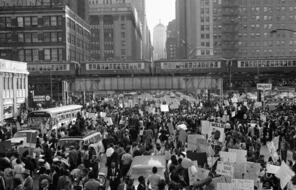
#IfTheyGunnedMeDown
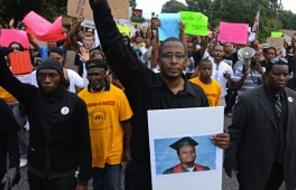
The Impact of Identity

The Power of Images
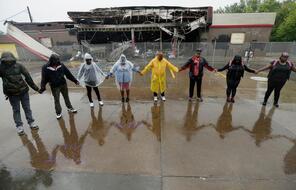
Preparing Students for Difficult Conversations

Social Media and Ferguson
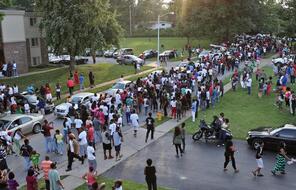
Verifying Breaking News

Facing Ferguson: News Literacy in a Digital Age

Reflecting on George Floyd’s Death and Police Violence Towards Black Americans
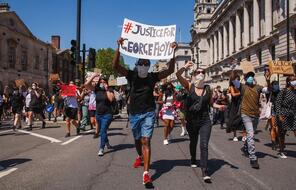
Responding to the Insurrection at the US Capitol
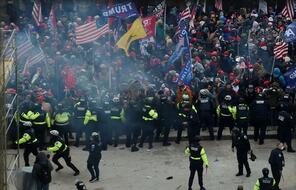
The Hope and Fragility of Democracy in the United States
What Happened During the Insurrection at the US Capitol and Why?
